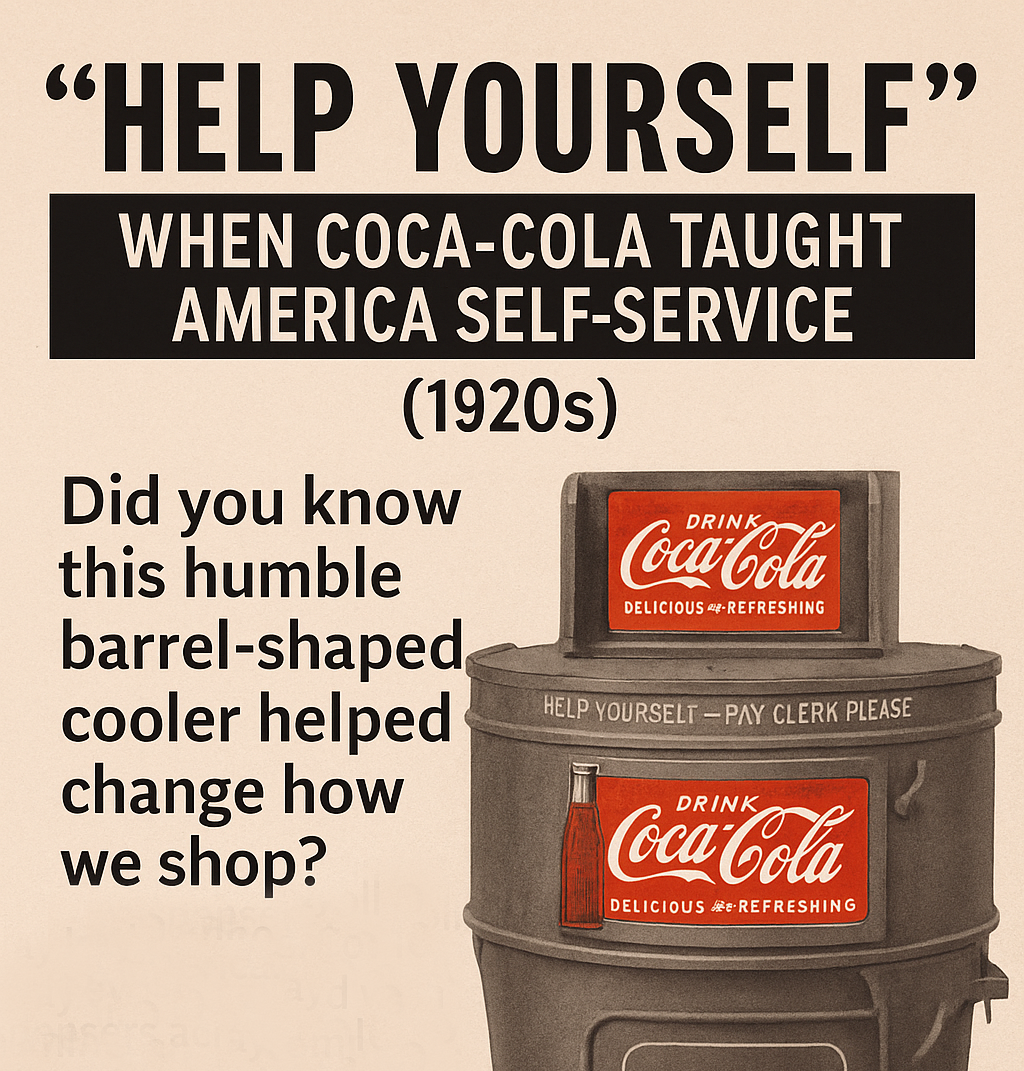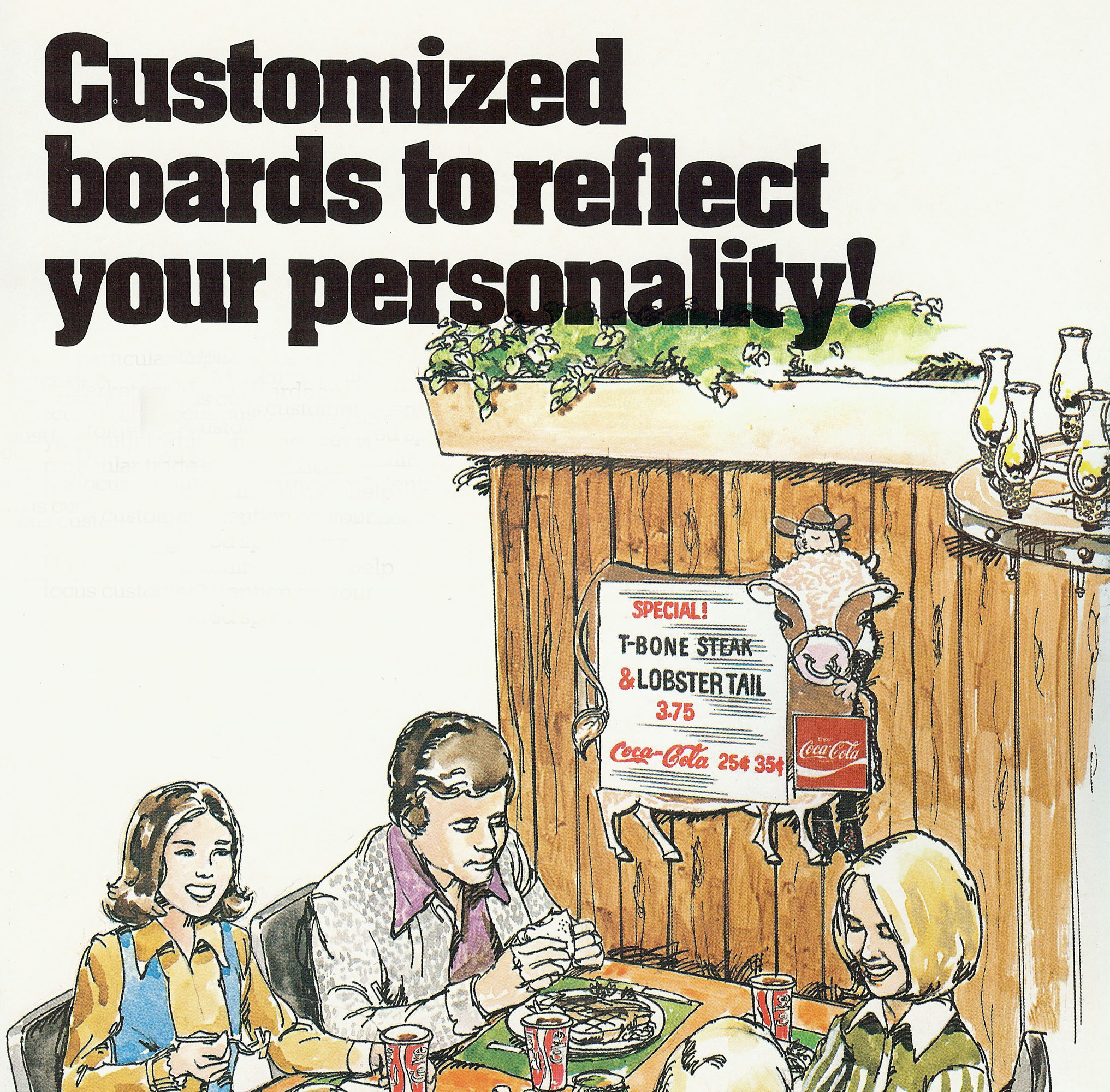- Soda Pop
- 1940s
- 1949
- Coin Op
- Dr Pepper
- Highway Steel Products
- Machines & Coolers
- Products
- Promotions
- Vending Machines
The Forgotten Story of Salesmaker Vending Machines and Dr Pepper’s Mid-Century Rise
A vintage vending revolution was happening in mid-20th century America. Vending machines were more than just conveniences, they were cutting-edge tools for boosting sales. Among them, the Salesmaker vending machines, built by Highway Steel Products Company in Chicago Heights, Illinois, stood out for their sleek design and bold promises. As the popularity of Dr Pepper surged, vending machines became essential for reaching a wider audience.
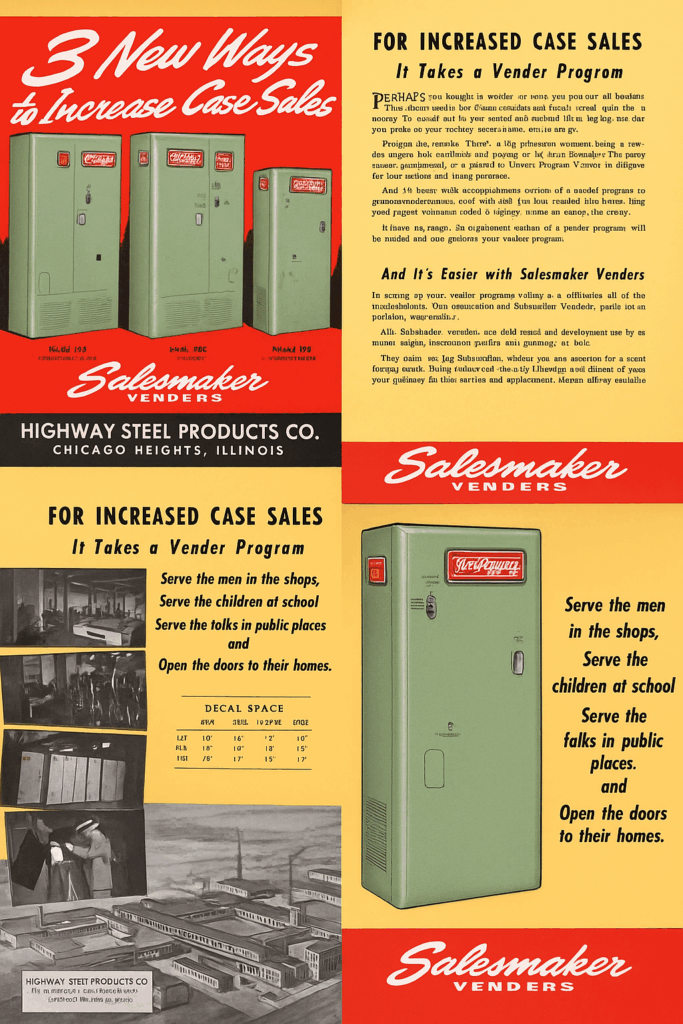
The vibrant Dr Pepper branding on these machines drew attention and increased sales for bottlers.
With their pale-green steel frames and the iconic red Dr Pepper logo, these machines became symbols of efficiency and modernity. Promising bottlers “3 New Ways to Increase Case Sales,” they offered a new vision in 1949 for soft drink distribution at factories, schools, and public spaces.
Table of Contents
- 1 The Chicago Heights Advantage: Highway Steel’s Industrial Hub
- 2 The Salesmaker Vender Program: A Game-Changer for Soda Bottlers
- 3 Why Dr Pepper Chose Salesmaker Venders
- 4 Built in Chicago Heights: Designed for Durability
- 5 “Serve the Men in the Shops…”
- 6 The Legacy of Salesmaker Vending Machines and Highway Steel
The Chicago Heights Advantage: Highway Steel’s Industrial Hub
Founded in 1924, Highway Steel Products Company grew up alongside Chicago’s rise as a national manufacturing powerhouse. Its factory in Chicago Heights, Illinois, a city 30 miles south of downtown Chicago, was perfectly situated in the dense web of railroads, highways, and industrial supply chains that defined the region.
Chicago Heights was a quintessential Rust Belt city, home to steel mills, foundries, and assembly plants. For Highway Steel, this meant access to skilled labor, raw materials, and shipping routes that could quickly move finished vending machines across the Midwest.
The company specialized in manufacturing durable metal products, and by the 1950s, its Salesmaker line had become a flagship offering. Every Salesmaker vending machine was stamped with this regional heritage: designed, tooled, and assembled under the same roof in Chicago Heights. This vertical integration allowed Highway Steel to control quality, reduce costs, and promise bottlers fast delivery, a critical edge in a competitive vending market.
The Salesmaker Vender Program: A Game-Changer for Soda Bottlers
The 1949 Salesmaker vending program wasn’t just about machines, it was a strategy. Highway Steel’s marketing directly addressed bottlers who had struggled with earlier vending efforts.
“Perhaps you bought a vender or two… and came up with a big red figure,” the copy confessed. Their solution? A full-scale “Vender Program” to deploy vending machines across key locations.
With options like the Model 197 (nine cases, one flavor), Model 297 (eight cases, two flavors), and Model 193 (four cases, one flavor), bottlers could tailor machine placement to different environments.
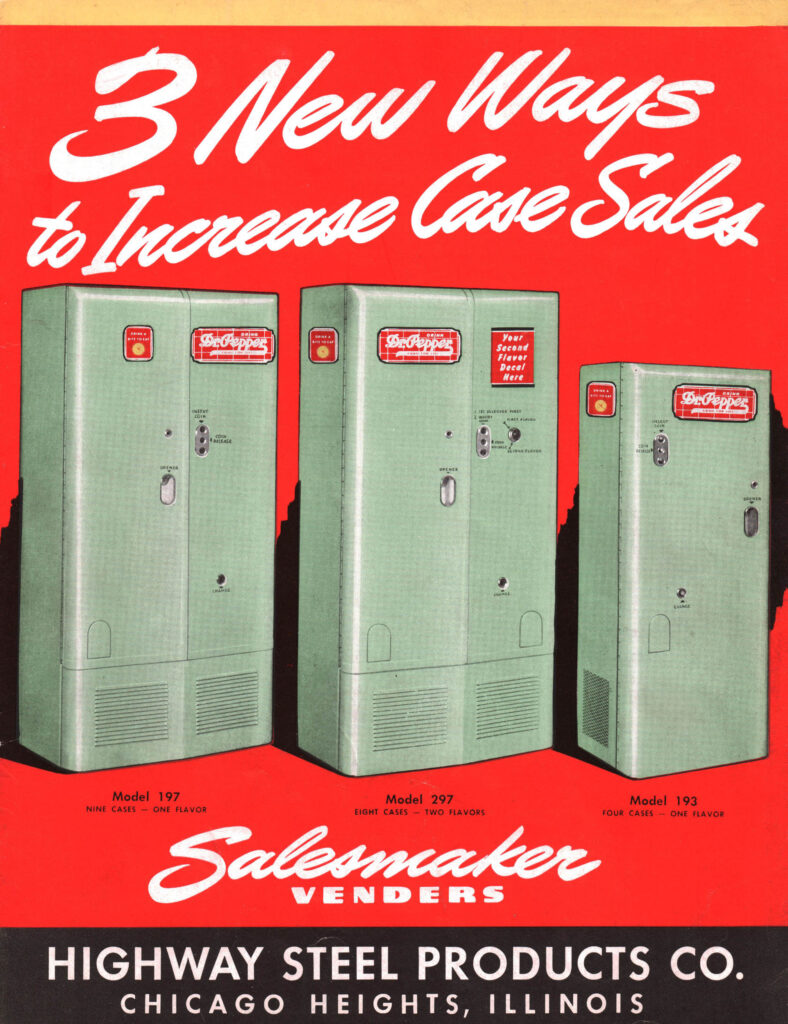
The unique flavors of Dr Pepper paired perfectly with the accessibility of vending machines. Featuring Dr Pepper prominently, these machines captured the interest of potential customers.
Why Dr Pepper Chose Salesmaker Venders
By the late 1940s, Dr Pepper was carving its niche in the competitive soda market. Its unique blend of 23 flavors and quirky marketing, including the famous “10-2-4” slogan, made it a natural fit for vending innovation.
Aligning with Highway Steel Products gave a chance to scale up. The Salesmaker vending machines placed the brand directly in the hands of workers on factory floors, students in school halls, and travelers in public spaces.
This partnership also anchored the expansion in the industrial Midwest. From Chicago Heights, Highway Steel shipped vending machines to bottlers nationwide, helping build a stronger presence in urban markets and small towns alike.
Built in Chicago Heights: Designed for Durability
Highway Steel’s Chicago Heights plant emphasized durability and design. Their machines featured:
✅ Interchangeable parts to simplify repairs
✅ Front-loading service panels for fast maintenance
✅ Heavy-gauge steel construction for years of service
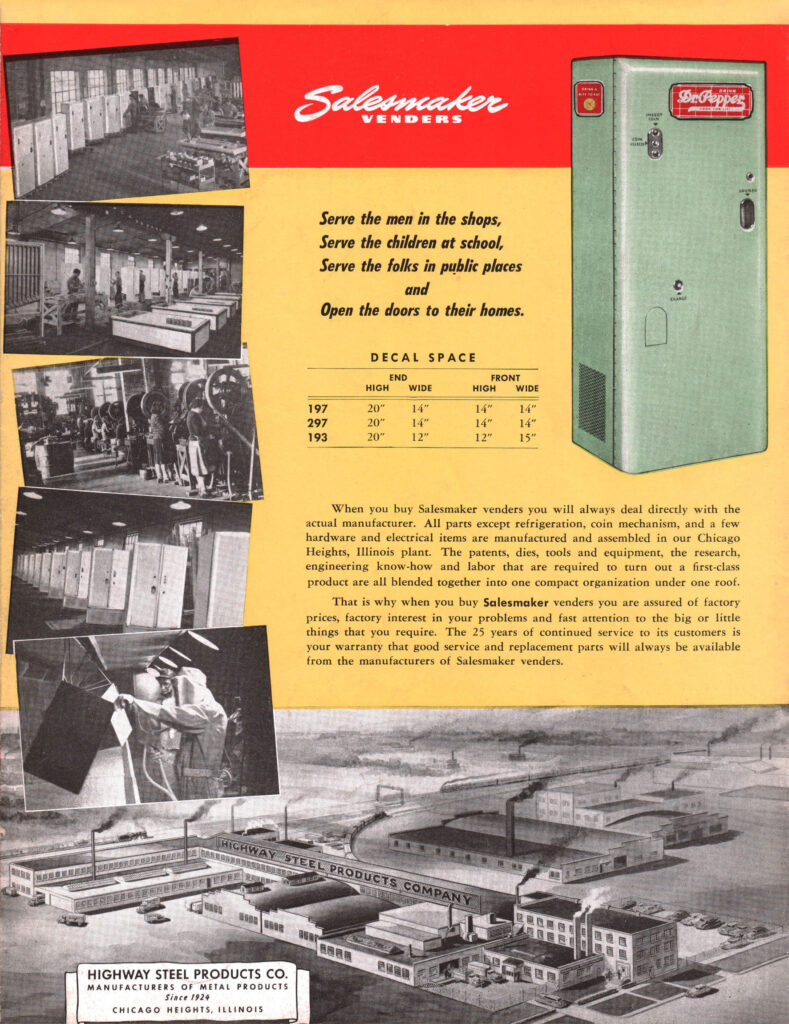
“All parts except refrigeration and coin mechanisms are manufactured in our Chicago Heights plant,” one ad declared. For bottlers, this meant fewer supply chain headaches and faster access to replacement parts.
The company claimed that with good locations, the machines could “pay for themselves in two years or less.” And their compact footprint made them ideal for smaller spaces, an asset in crowded urban environments like Chicago.
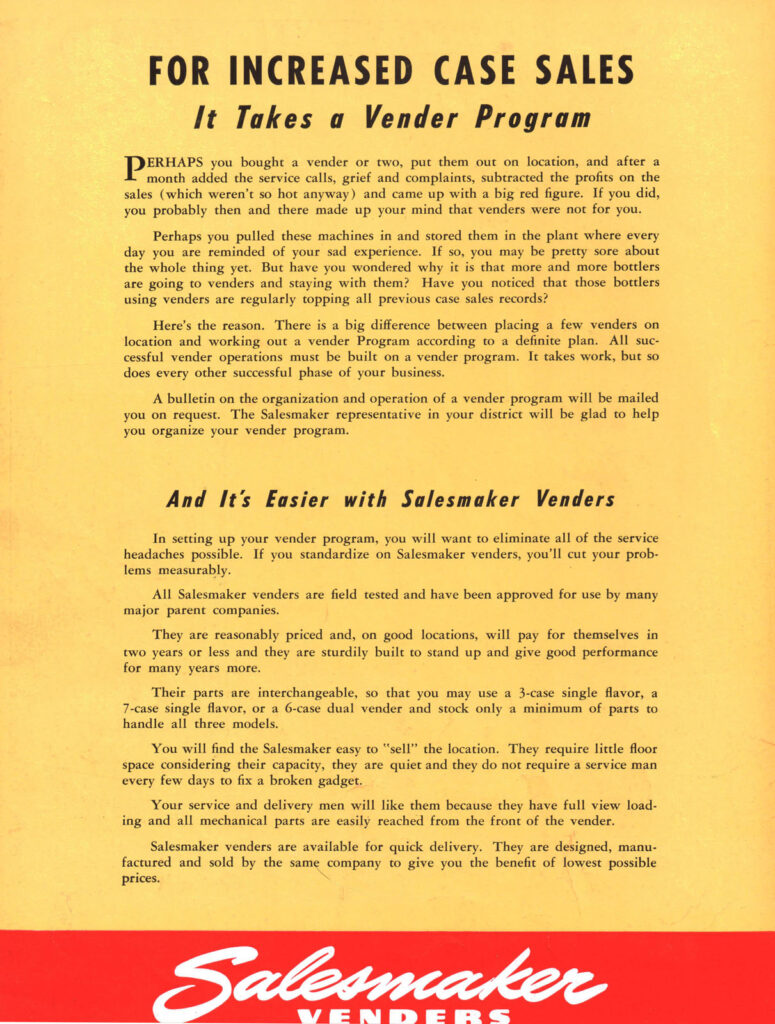
Sales of Dr Pepper flourished as machines became fixtures in various locations.
Dr Pepper remains a nostalgic favorite for those who remember using these vending machines.
“Serve the Men in the Shops…”
One memorable tagline summed up the mission:
“Serve the men in the shops, serve the children at school, serve the folks in public places and open the doors to their homes.”
While few machines ever made it into private homes, they became a fixture in workplaces and public venues. The strategy worked, driving Dr Pepper’s visibility in untapped markets and giving Highway Steel Products a firm foothold in the vending industry.
The Legacy of Salesmaker Vending Machines and Highway Steel
Today, surviving Salesmaker vending machines are rare and prized by collectors of vintage vending machines and memorabilia. Their mid-century aesthetic, muted green panels with red accents, evokes nostalgia for a time when steel and soda symbolized modernity.
The Highway Steel Products Company may no longer operate in Chicago Heights, but its impact lingers in these sturdy artifacts of mid-century design. These vending machines tell a larger story about American industry, how small city factories like those in Chicago Heights powered national brands and redefined daily life.
In many ways, Salesmaker venders were predecessors of today’s on-demand culture. They promised a seamless transaction: a nickel in, a cold drink out. That promise, both alluring and fragile, still resonates in our age of apps and instant delivery.




